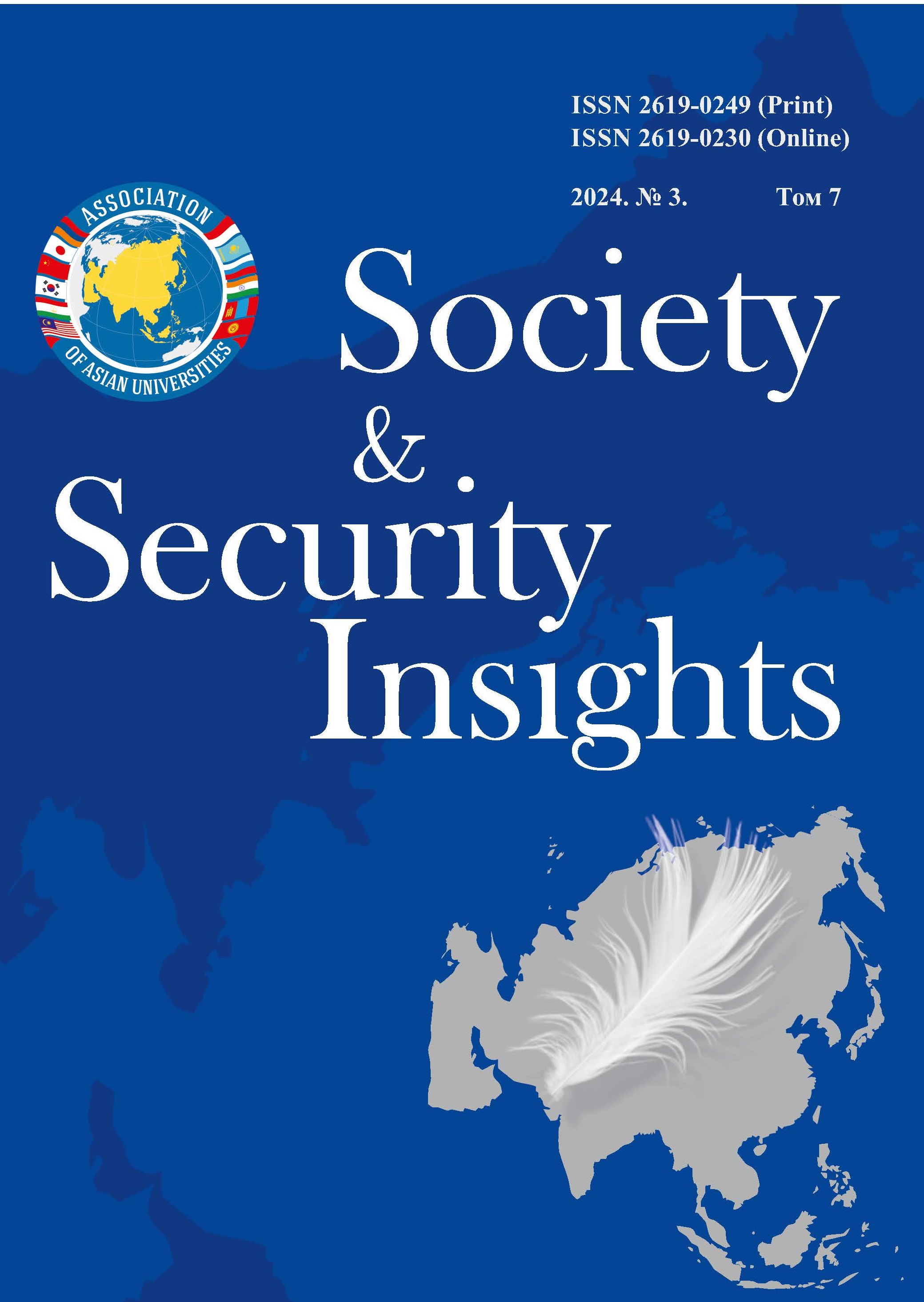CORRELATION OF FAMILY AND NON-FAMILY VALUES IN THE CONTEXT OF REPRODUCTIVE BEHAVIOR
Main Article Content
Abstract
The purpose of this work is to analyze the correlation of family and non-family values in the consciousness of a modern person, the transformation of reproductive attitudes of residents of Russia and other countries. The article analyzes the key trends in the hierarchy of value attitudes of modern youth, compares the results of national and global representative studies. The key family and non-family values were highlighted, and a comparison was made with changes in the socio-demographic situation in various countries. To identify key trends, the results of representative studies conducted by large sociological centers such as VTSIOM, FOM and others were used. The reproductive attitudes of Russians and residents of other countries, attitudes towards fertility, having many children and having few children were analyzed. According to the results of the study, common family and reproductive practices were identified. The scientific novelty of the study is to identify the relationship between the transformation of family and non-family value systems and reproductive behavior. Based on the results obtained, the author concluded that the conflict-prone nature of the relationship between family and family values is especially acute among young people.
Downloads
Metrics
Article Details

This work is licensed under a Creative Commons Attribution 4.0 International License.
Authors retain the copyright of their manuscripts, and all Open Access articles are distributed under the terms of the Creative Commons Attribution License, which permits unrestricted use, distribution, and reproduction in any medium, provided that the original work is properly cited.
References
Безрукова О. Н. Отцовство в трансформирующемся обществе: ожидания матерей и практики отцов // Социологические исследования. 2013. № 11. С.118-130
Безрукова О.Н., Самойлова В.А. Материнский гейткипинг в России: молодые отцы о матерях и барьерах доступности детей после развода // Мониторинг общественного мнения: экономические и социальные перемены. 2020. № 3. С. 463-498
Гидденс Э. Социология / При участии К. Бердсолл: Пер. с англ. Изд 2-е. М.: Едиториал УРСС, 2005. 632 с.
Демографическая ситуация в России: репродуктивная активность населения: Аналитический доклад / Д. Ф. Алиев, Е. М. Бронникова, Д. В. Волков [и др.]; Российский государственный социальный университет. – Москва: РГСУ, 2023. 260 с.
Зайцева И.А. Региональная семейная политика детствосбережения: политический и правовой аспекты // Теории и проблемы политических исследований. 2020 Том 9 № 4А. С. 108-116
Кашина М.А. Модернизация семьи в России и Китае: роль государства // Управленческое консультирование. 2020 (8). С. 175-190
Коннелл Р. У., Мессершмидт Д. У. Гегемонистская маскулинность: переосмысление концепции // Гендер и общество. 2010. 19 (6). С. 829–859
Лебедева Л.Г. Отношение поколений к семье, детям и межпоколенческие отношения: проблемы и тенденции // NOMOTENIKA: Философия. Социология. Право. 2021. 46 (1). С. 47-51
Ржаницына Л. С. Улучшение положения детей в разведенных семьях // Социологические исследования. 2015. № 3. С. 65–69
Танатова Д. К., Королев И.В. Демографические тенденции и репродуктивные установки населения России // Социальная политика и социология. 2023. Т. 22, № 3(148). С. 21-28
Трошкина И.Н. Семейные ценности: категория, структура // Философская мысль. 2022. № 12. С. 1-9
Человек. Цивилизация. Общество / Питирим Сорокин; [Общ. ред., сост. и предисл., с. 5-24, А. Ю. Согомонова]. М.: Политиздат, 1992. 542 с.
Чернова Ж. В. Репрезентации отцовства: социологический анализ блогов // Интеракция. Интервью. Интерпретация. 2018. Т. 10, № 15. С. 6-23
Doherty W. J., Kouneski E. W., Erickson M. F. Responsible fathering: An overview and conceptual framework // Journal of Marriage and the Family. 1998. No. 60(2). P. 277–292
Lamb M. E. The role of the father in child development. Hoboken: John Wiley & Sons, 2010.
REFERENCES
Aliyev, D.F. (2024). Sociological monitoring of family well-being and reproductive attitudes of the Russian population: A scientific and practical guide. Moscow: RGSU (In Russ.).
Bezrukova, O. N. (2013). Fatherhood in a transforming society: expectations of mothers and practices of fathers. Sociologicheskie issledovanija. 11, 118-130 (In Russ.).
Bezrukova, O.N., Samoilova, V.A. (2020). Maternal gatekeeping in Russia: young fathers about mothers and barriers to the availability of children after divorce. Monitoring obshhestvennogo mnenija: jekonomicheskie i social'nye peremeny. 3, 463-498 (In Russ.).
Giddens, E. (2005). Sociology / With the participation of K. Birdsall: Translated from English. Ed. 2-E. Editorial URSS (In Russ.).
Demographic situation in Russia: reproductive activity of the population: An analytical report (2023) / D. F. Aliyev, E. M. Bronnikova, D. V. Volkov [et al.]; Russian State Social University. – Moscow: RGSU (In Russ.)
Zaitseva, I.A. (2020). Regional family policy of child care: political and legal aspects. Teorii i problemy politicheskih issledovanij. 9 (4A), 108-116 (In Russ.).
Kashina, M.A. (2020). Modernization of the family in Russia and China: the role of the state. Upravlencheskoe konsul'tirovanie. 2020 (8), 175-190 (In Russ.).
Connell, R. W., Messerschmidt, D. W. (2010). Hegemonic masculinity: rethinking the concept. Gender i obshhestvo. 19 (6), 829-859 (In Russ.).
Lebedeva, L.G. (2021). The relationship of generations to family, children and intergenerational relations: problems and trends. NOMOTENIKA: Filosofija. Sociologija. Pravo. 46 (1), 47-51 (In Russ.).
Rzhanitsyna, L. S. (2015). Improving the situation of children in divorced families. Sociologicheskie issledovanija. 3, 65-69 (In Russ.).
Tanatova, D. K., Korolev, I.V. (2023). Demographic trends and reproductive attitudes of the Russian population. Social'naja politika i sociologija. 3(148), 21-28 (In Russ.).
Troshkina, I.N. (2022). Family values: category, structure. Filosofskaja mysl'. 2022. 12, 1-9 (In Russ.).
People. Civilization. Society / Pitirim Sorokin (1992). [General ed., comp. and preface, pp. 5-24, A. Y. Sogomonova]. M.: Politizdat (In Russ.).
Chernova, J. V. (2018). Representations of fatherhood: a sociological analysis of blogs. Interakcija. Interv'ju. Interpretacija. 10 (15), 6-23 (In Russ.).
Doherty, W. J., Kouneski, E. W., Erickson M. F. (1998). Responsible fathering: An overview and conceptual framework. Journal of Marriage and the Family, 60(2), 277–292.
Lamb, M. E. (2010). The role of the father in child development. Hoboken: John Wiley & Sons.


 https://orcid.org/0009-0009-0127-9414
https://orcid.org/0009-0009-0127-9414